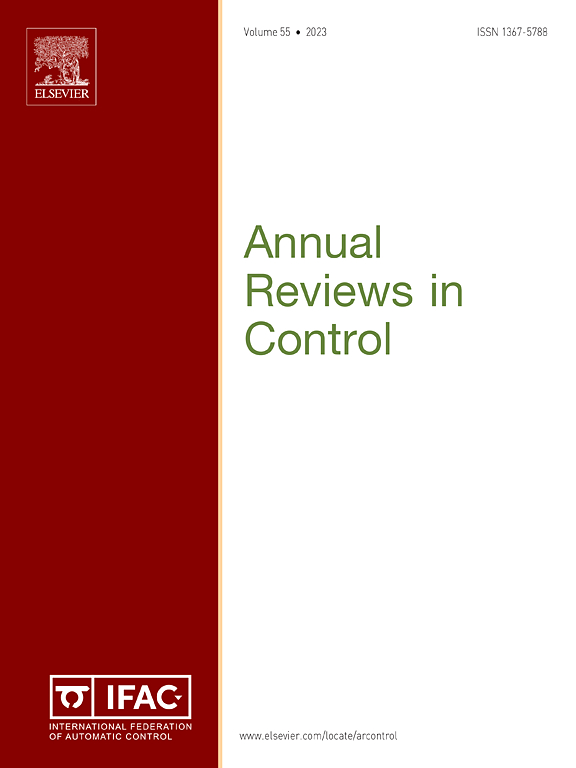元启发式优化算法在化学工程过程模型预测控制中的应用:系统综述
IF 10.7
2区 计算机科学
Q1 AUTOMATION & CONTROL SYSTEMS
引用次数: 0
摘要
随着化工行业竞争力的不断增强,以及可持续发展需求和监管要求的不断提高,要求对操作进行优化和良好控制。化学工程过程通常具有非线性、强变量耦合、死区时间、多输入输出和操作限制等特点,这使得控制策略具有挑战性。模型预测控制因其在优化控制、灵活性、鲁棒性和处理多目标任务方面的优势而被广泛应用。然而,要在实时应用中实施这一策略,精确的调整和优化是必不可少的。元启发式优化算法是传统优化方法的替代方案,因为它们可以快速达到近似最优解,并避免局部最小值,因此非常适合用于模型预测控制。本研究旨在通过系统性综述,分析元启发式优化算法与模型预测控制在化学工程过程中的结合应用。综述考虑了三个资格标准:将模型预测控制应用于过程控制、利用元启发式优化算法以及化学工程相关过程。共分析了 46 项研究,揭示了元启发式优化算法在模型预测控制中的三个主要应用领域:改进后退视界中使用的动态模型、调整模型预测控制参数以及作为模型预测控制配方中的优化器。我们确定了 20 多种不同的元启发式优化算法和各种工艺模型,其典型应用包括连续搅拌罐反应器、罐液控制和塔式蒸馏。遗传算法和粒子群优化是最常用的算法。本综述的结论是,元启发式优化算法已成功应用于多个过程,以增强模型预测控制。综述还强调了元启发式优化算法在化学工程过程中应用的优点、缺点和局限性,并对未来研究提出了建议。我们希望本研究能对化学工程和过程控制领域的专业人员和研究人员有所帮助。本文章由计算机程序翻译,如有差异,请以英文原文为准。

Applications of metaheuristic optimization algorithms in model predictive control for chemical engineering processes: A systematic review
The growing competitiveness of the chemical industry, along with sustainability demands and regulatory requirements, calls for optimized and well-controlled operations. Chemical engineering processes are often characterized by non-linearity, strong variable coupling, dead times, multiple inputs and outputs, and operational constraints, making control strategies challenging. Model predictive control is widely used for its advantages in optimal control, flexibility, robustness, and ability to handle multi-objective tasks. However, precise tuning and optimization are essential for implementing this strategy in real-time applications. Metaheuristic optimization algorithms offer an alternative to traditional optimization methods, as they can quickly reach near-optimal solutions and avoid local minima, making them well-suited for use with model predictive control. This study aims to analyze the application of metaheuristic optimization algorithms in conjunction with model predictive control in chemical engineering processes through a systematic review. The review considers three eligibility criteria: applying model predictive control for process control, utilizing metaheuristic optimization algorithm, and chemical engineering-related processes. A total of 46 studies were analyzed, revealing three main application areas for metaheuristic optimization algorithms in model predictive control: improving dynamic models used in the receding horizon, tuning model predictive control parameters, and serving as optimizers in the model predictive control formulation. Over 20 different metaheuristic optimization algorithms and various process models were identified, with typical applications including continuous stirred tank reactors, tank-level control, and column distillation. Genetic algorithms and particle swarm optimization were the most frequently used algorithms. This review concludes that metaheuristic optimization algorithms have been successfully applied to enhance model predictive control in several processes. It also highlights the benefits, weaknesses, and limitations of metaheuristic optimization algorithms applications in chemical engineering processes and provides recommendations for future research. We hope this study will be valuable to professionals and researchers in chemical engineering and process control.
求助全文
通过发布文献求助,成功后即可免费获取论文全文。
去求助
来源期刊

Annual Reviews in Control
工程技术-自动化与控制系统
CiteScore
19.00
自引率
2.10%
发文量
53
审稿时长
36 days
期刊介绍:
The field of Control is changing very fast now with technology-driven “societal grand challenges” and with the deployment of new digital technologies. The aim of Annual Reviews in Control is to provide comprehensive and visionary views of the field of Control, by publishing the following types of review articles:
Survey Article: Review papers on main methodologies or technical advances adding considerable technical value to the state of the art. Note that papers which purely rely on mechanistic searches and lack comprehensive analysis providing a clear contribution to the field will be rejected.
Vision Article: Cutting-edge and emerging topics with visionary perspective on the future of the field or how it will bridge multiple disciplines, and
Tutorial research Article: Fundamental guides for future studies.
 求助内容:
求助内容: 应助结果提醒方式:
应助结果提醒方式:


